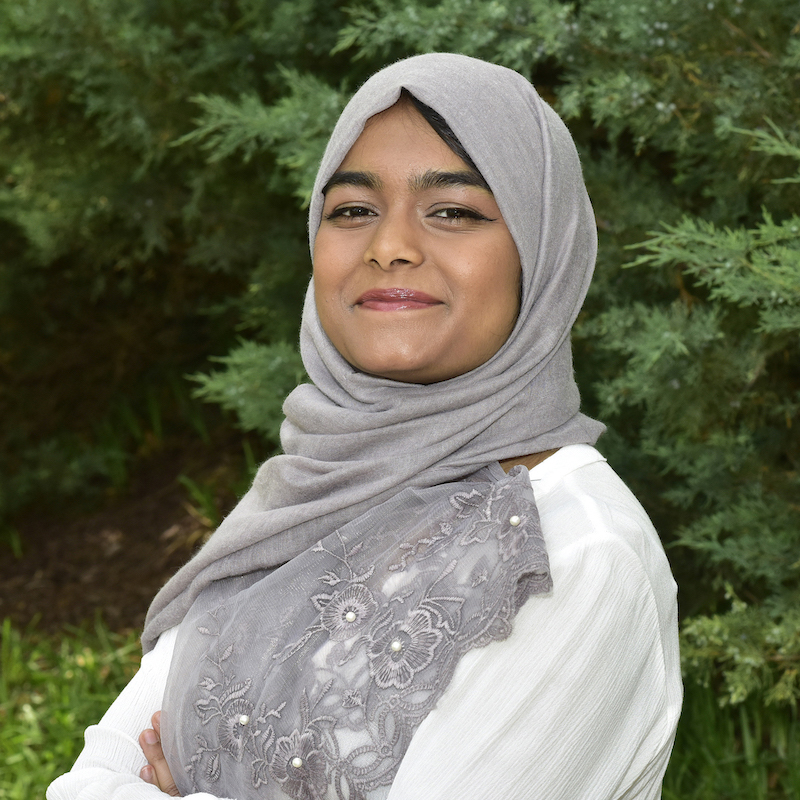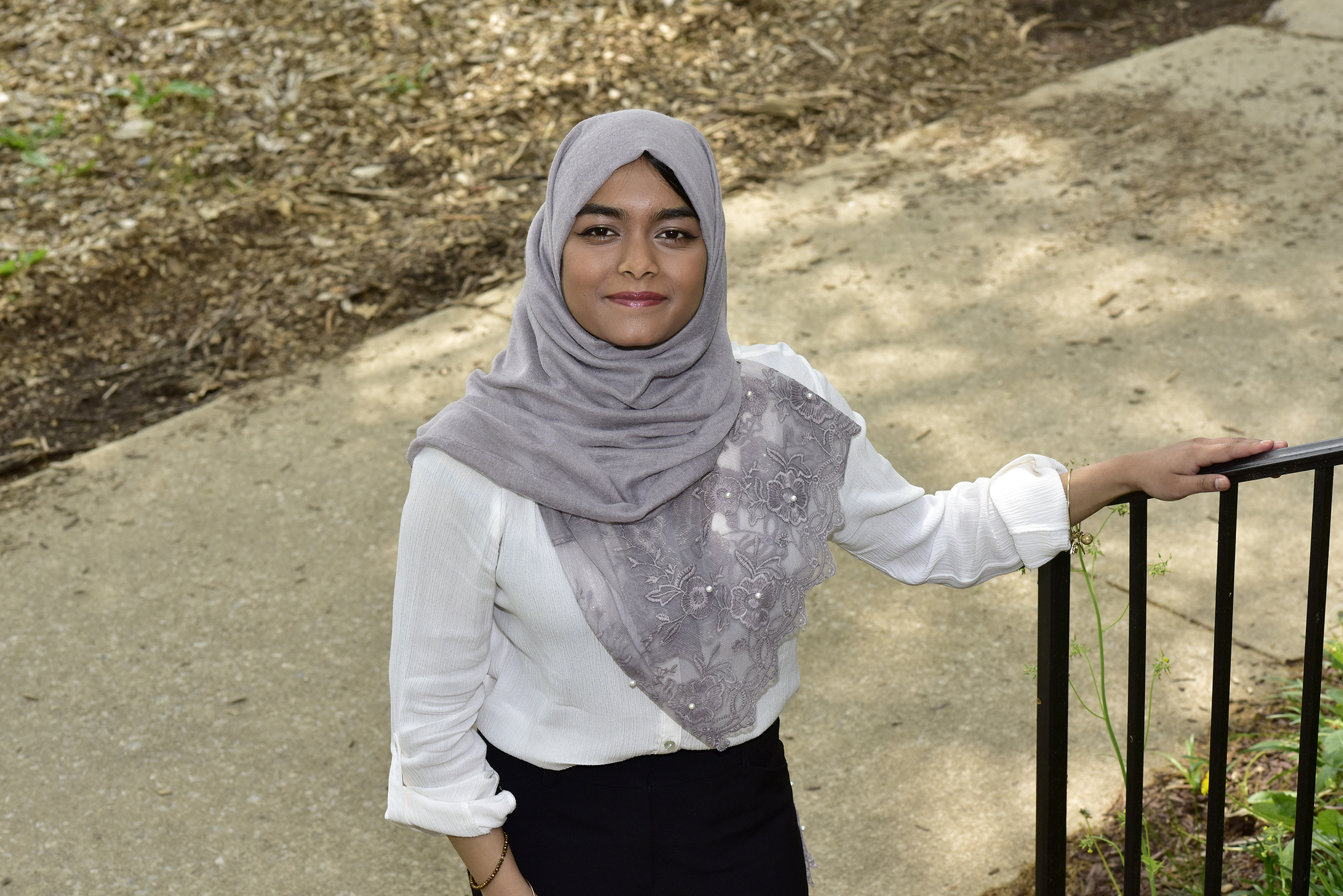
A global perspective is important.
Spring 2023
In her very first class in UMD’s CEE department, ENCE100, Rubina Hasanat began to sense the resonance of civil engineering with some of her broader social concerns, such as international development, poverty alleviation, and climate change. Rubina had entered the CEE Department at UMD as a freshman in 2019. She had always enjoyed math and science, and was interested in design-oriented work. But she had also heard stories told by her parents of financial hardship in their home country of Bangladesh, which made her aware of the inequities in access to reliable infrastructure. “A lot of the systems we have here, we take for granted,” she says. She is now a senior in the Geotechnical and Structural track, and her interest in the intersection of engineering and social issues has grown into a passion.
Given these interests, Rubina has found the “forward-thinking focus on social issues” of some of the CEE faculty inspiring. Of the new Department Chair Dr. Attoh-Okine, she says his “global perspective” is important “because he's aware of the role that companies and economics play in engineering worldwide, and how they can promote or reduce inequities across the world. I hope that perspective on engineering ethics trickles down to students in the department.” The faculty have also helped her realize that “as an engineer, you have to design things to deal with climate change on a daily basis. You’re part of the solution to such a big problem,” she says. She also appreciates our department’s gender diversity. Seeing women represented in the field “helps you feel like you belong in the profession.”
Rubina also appreciates the department’s active student body, saying that being part of CEE’s student groups has given her hands-on experience of the things she’s learned in class. Most of Rubina’s experience with student groups has been, by necessity, confined to the last two years. She joined ASCE and was involved in Concrete Canoe as a freshman, but in her second semester the Covid pandemic struck, and she spent almost the entirety of three semesters learning remotely. She tried to stay involved with the campus community, including becoming a member of Maryland Sustainability Engineering (MDSE), the sister organization of Engineers Without Borders. Like many students, she found it hard to focus and engage with online learning, though she says some faculty did a good job making learning as interactive as possible. But she on the positive: spending time with family, including with her father, a nuclear engineer.
As soon as she returned to campus, Rubina increased her involvement as a member and a leader of several organizations. In her junior year, she was the sub-team leader for MDSE’s Sierra Leone team, working on a latrine system for a school. She also organized workshops for MDSE, including a concrete-pouring workshop, a masonry workshop, and a wood-working workshop. She appreciated getting to work with engineers from other departments in an interdisciplinary way.
Rubina also joined ASCE as a Junior, and this year she is the chapter’s Webmaster. This means she manages its social media and communications. She is very intentional about trying to promote the organization to new students, as she believes it provides great community-building and professional development opportunities. She wants to connect students to the larger chapter, so they will remain involved even as alumni and have the opportunity for further professional development and life-long learning.
Rubina is also Undergraduate Representative for the CEE Department’s DEI (Diversity, Equity, and Inclusion) Committee. She has been involved in the committee from its inception in 2020. She organizes outreach events as well as social events for the committee. She often represents both ASCE and the DEI Committee in ENCE100 and at events like open houses for admitted students. Rubina feels like she has gained as much as she’s given in her various student leadership roles. “Being active in leadership has taught me so much,” she says, adding that “our diverse student body allowed me to learn about the variety of engineering challenges faced across the world.”
Rubina is also part of several organizations on campus beyond the department, including the Muslim Student Association, the Pakistani Student Association, and the Organization of Arab Students. “I’ve made a majority of my friends in these groups,” she says.
Rubina has also done undergraduate research; as a junior she worked with Dr. Aydilek on a geo-environmental project. With his team she examined how effectively compound-amended soils can remove pollutants from highway storm-water runoff.
Additionally, Rubina has interned with Tesla for two summers. In 2021 she worked with Tesla Motors remotely on their Fremont Infrastructure Design team, but in 2022 she was in-person on Tesla Energy’s Supercharger Team. She found the first internship through a Zoom networking event sponsored by the Society of Women Engineers. “People don’t think of civil engineers in tech,” she says, “but civil is really broad.” Over these summers, she helped develop and implement factory improvements and stormwater management plans. She describes the company’s culture as fast-paced but informal; “it valued people’s technical knowledge and reliability over how they looked or dressed.” She enjoyed meeting talented people from diverse backgrounds across the world, and getting a sense of civil engineering’s intersection with other disciplines.
Rubina doesn’t have much free time, but when she does, she enjoys playing story-based video games, reading, cooking, and art. She will be graduating this May, and this summer she will be going to Denmark as part of Dr. Kjellerup’s “Global Green Challenge” class. Then she will be working for the engineering firm RK&K, which she describes as having a “growing focus on community-oriented efforts.”
Rubina’s concern with international development and on effective, sustainable altruism are sure to be key to her future endeavors. Eventually she hopes to get a doctorate and possibly become a professor. “With whatever job I pursue, I want to make sure it’s doing something beneficial,” she says. “To ‘do good" is a very fundamental part of my faith, and I feel that a great way to act on that is by educating the coming generations of engineers on global and ethical issues to make a better, more equitable world.”

Top